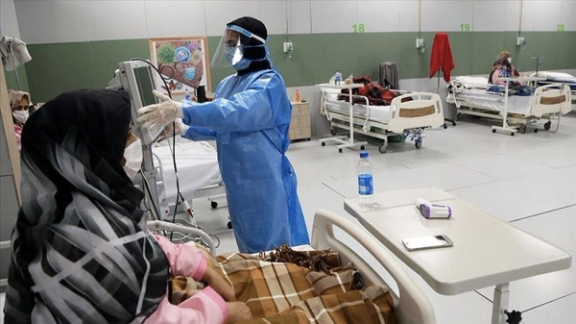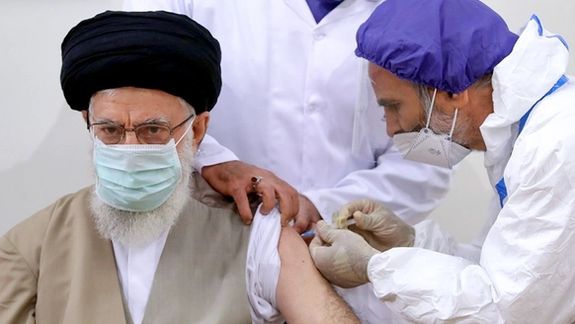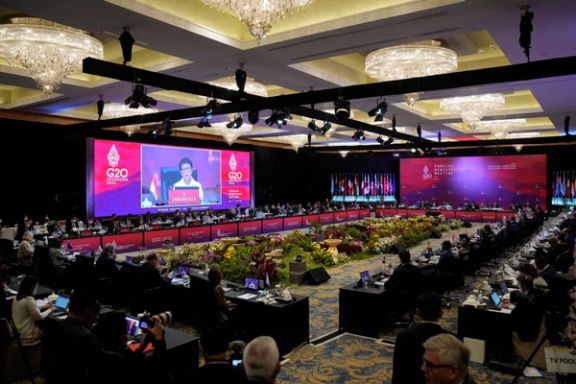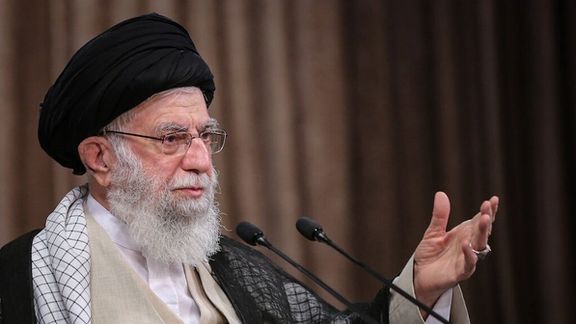Covid-19 Cases Multiplying In Iran

The growing number of Covid-19 patients in Iran has prompted the Health Ministry to announce new restrictions in the country while several provinces are deemed "red zones.”

The growing number of Covid-19 patients in Iran has prompted the Health Ministry to announce new restrictions in the country while several provinces are deemed "red zones.”
Expressing worries over the resurgence of the pandemic across the country, the spokesman for Iran’s Covid-19 taskforce, Abbas Shirozhan, said on Saturday that four cities are now "red," 14 cities are categorized as "orange,” and 142 cities as “yellow.”
Shirozhan called on the people to use masks, especially in the cities with higher numbers of people infected with the virus.
Last week, the Health Ministry announced that the number of people hospitalized due to Covid-19 complications has tripled, as new variants are about to sweep across the country.
Masoud Younesian, the secretary of the epidemiology and research committee of the national coronavirus taskforce, said on July 1 that two new subvariant of Omicron, namely BA4 and BA5 -- which started in the African continent -- may soon prevail over the country.
Iran’s homegrown Covid vaccine factories are shutting down for lack of demand as many vaccinated with foreign vaccines refuse to get homegrown ones as boosters.
According to the latest official figures, nearly 65 million Iranians have had one dose, 58 million two doses but only 27 million have had a third shot of the vaccine. Vaccine imports stopped a few months ago and the only vaccines available for a booster now are homegrown variants.
The number of deaths in Iran since Covid-19 began has been 300,000 higher than in previous years, suggesting pandemic deaths may be more than officially reportedfigure ofaround 141,000 deaths.

Iran’s homegrown Covid vaccine factories are shutting down for lack of demand as many vaccinated with foreign vaccines refuse to get homegrown ones as boosters.
The whole scheme of producing domestic vaccines now seems little more than wasting hundreds of millions of dollars and precious time in preventing tens of thousands of deaths in 2021.
According to the latest official figures, nearly 65 million Iranians have had one dose, 58 million two doses but only 27 million have had a third shot of the vaccine. Of the total of 150 million doses administered so far, the Chinese Cinopharm accounts for over 80 percent and AstraZeneca for around 10 percent. Vaccine imports stopped a few months ago and the only vaccines available for a booster now are homegrown variants.
Only a total of 20 million (13%) used in the vaccination program so far were produced by the seven Iranian developers that received support and funding from the government. None of Iran’s seven homegrown vaccines has received the approval of the World Health Organization.
Some Iranian physicians believe many Iranians are refusing to get a third shot because they were inoculated with foreign-made vaccines before but will now have to get homegrown ones with doubtful efficacy against new Covid variants.
Lack of demand has led to homegrown Covid vaccine production lines shutting down one after the other and millions of doses are near expiration in storage.
All domestic developers, including the Barekat Foundation and Razi Institute, for instance, hav millions of doses of unsold vaccines which will soon expire. Developers will go bankrupt, they say, if the government does not purchase their products but the government already has 50 million doses in storage and no cash to even pay the rest of its debts, around $250 million, for the 50 million doses of homegrown vaccines it purchased before.

Some of the vaccine producers, including the state-owned Barekat Foundation, received hundreds of millions of dollars to start their vaccine development program from scratch despite having had no experience in the field.
Mohammad Mokhber, the head of the Barekat Foundation who is now vice president in President Ebrahim Raisi’s administration, repeatedly promised that the foundation would be delivering fifty million doses of its product, CoVIran-Barekat, before August 2021 to be used in the vaccination program. These promises never materialized.
Iran's national vaccination plan did not make any significant progress before presidency was handed over to Raisi in August last year. Raisi has repeatedly boasted about the success of his government in mass vaccination and Covid management.
But critics say centers of power controlled by hardliners impeded fromer President Hassan Rouhani’s vaccine purchases and once he was gone, allowed vaccines already ordered to flow into carry out the vaccination plans and take credit for it.
This resulted in a new wave of infection in the summer of 2021 to kill around 40,000 unvaccinated citizens.
The Rouhani government had ordered 16.5 million doses of these vaccines, the only ones approved by World Health Organization (WHO) at the time, through WHO’s Covax program, but Khamenei banned the purchase of American and British Covid vaccines in early January 2021 putting forth a conspiracy theory that the two counties could not be trusted.
Some hardliners including a top IRGC official even claimed that there was evidence that foreign companies producing Covid-19 vaccines wanted to reduce the world population by 20 percent or that their vaccines were meant to use as biological weapons against Iranians.

An Israeli intelligence official told Iran International that the IRGC routinely uses criminal gangs for terrorist operations in other countries such as Turkey.
“The IRGC has for many years employed criminal gangs and mafia [like groups] in various countries including Turkey for terrorist operations,” an Israeli intelligence official told Iran International’s correspondent in Tel Aviv regarding Turkish media’s recent allegations that the Iran’s Guards had employed organized criminals for foiled attacks on Israeli tourists last month.
The official who did not want to be named alleged that the IRGC’s extra-territorial arm, the Qods (Quds) Force and the its Intelligence Organization (SAS) have used criminal gangs, drug traffickers, and even ordinary criminals for such operations in Turkey, South America, and Cyprus.
Turkey’s intelligence organization (MIT) and Israel’s Mossad last month said they had foiled alleged Iran-hatched plots to abduct and assassinate Israeli tourists in Turkey.
On June 23, just before the arrival of then-Israeli Foreign Minister Yair Lapid to Turkey, MIT revealed that it had detained eight suspects, allegedly working for an Iranian intelligence cell, who were involved in the plot.
The suspects who were arrested in raids on three separate houses in Istanbul said that they were not in direct contact with Iranian intelligence and took their orders from the leader of an Iranian organized crime group who was in Iran, through WhatsApp, Turkish media reported.
Turkey’s Yeni Şafak has reported that the cell was plotting two different operations, one to abduct former Israeli diplomat Yossi Levi-Sfari and his partner, and another against three Israeli women who resided in an Istanbul hotel.
According to Turkish media, three of the six Iranian suspects, have said in their interrogations that the terrorist operations were ordered by Iranian intelligence. One of the Iranian suspects who had the actual assassin’s role traveled to Iran four times in two months and met with a criminal group’s leader in Iran four days before his arrest.
The Iranian members of the of the terrorist cell had entered Turkey legally two months earlier but two of them had used forged passports, Turkish media say.
The Israeli intelligence official cited Mansour Rasouli, an Iranian national reportedly abducted and interrogated inside Iran by Israeli Mossad, as an example.
On April 30, Israeli media released an audio recording with the photo of a man introduced as Iranian national Mansour Rasouli, 52, who they claimed the Mossad had interrogated inside Iran. Israeli media did not provide a source for the audio file that they said Mossad operatives posing as Iranian secret service agents recorded at Rasouli's home in Iran.
In the audio file Rasouli admitted that that he had been instructed by the IRGC to establish an operational network to assassinate an Israeli diplomat in Istanbul, a Germany-based US general, and a journalist in France. Officials in Tehran never commented on Israeli media’s claims but Rasouli himself later released a video online in which he said he had been coerced by the Mossadto confess to terror plots.
In past few months there were multiple mysterious incidents in which IRGC officers and operatives were killed or died in unexplained circumstances. Iran blamed Israel for some of the incidents. Israel has not taken responsibility for the assassinations but has not denied involvement, either.
The IRGC’s counter-intelligence chief Hossein Taeb was replaced last month. Taeb was recently harshly criticized by social media activists and some politicians for failing to detect and prevent Israel's operations in Iran.

The United States, France, Germany and Britain have once again called on Iran to abandon its demands that are beyond the 2015 nuclear deal and agree to the current agreement at hand.
The foreign ministers of the United States, France, Germany and the deputy foreign minister of the United Kingdom made the call in a meeting of the Transatlantic Quad foreign ministers on the sidelines of the Group of 20 ministerial meeting in Bali, Indonesia on Friday.
According to a readout of the meeting by the US Department of State, Secretary Antony Blinken, French Foreign Minister Catherine Colonna, German Foreign Minister Annalena Baerbock, and UK Second Permanent Under Secretary and Political Director Tim Barrow expressed concern about the pace of developments in Iran’s nuclear program.
They reiterated their commitment to a mutual return to full compliance with the JCPOA (the Joint Comprehensive Plan of Action), calling on Iran to drop its extraneous demands and to quickly agree to the deal that is currently available.
Following the failure of Tehran-Washington proximity talks in Qatar last week, the US State Department says there is no plan for another round of talks for now. There has been a deal on the table that is more or less finalized for several months now, he said.
On Wednesday, Qatar’s Foreign Minister Mohammed bin Abdulrahman Al Thani visited Iran to discuss the latest development on kickstarting the nuclear talks, which had stalled for months.

An Iranian-born senior official of the German domestic intelligence agency has recently made a personal visit to Iran following the death of her father.
German-language news magazine Focus reported on Friday that Felor Badenberg, the vice president of the Federal Office for the Protection of the Constitution (BfV) violated the strict security precautions of her own agency by making the private trip to the Islamic Republic, as many European countries as well as the United States are struggling to secure the release of their citizens held in Iran.
Badenberg, who was only promoted to the top of federal intelligence agency on June 22 by Interior Minister Nancy Faeser, flew to the Iranian capital months ago to settle inheritance matters after the death of her father. She had been previously the head of the Right-Wing Extremism and Terrorism Department of the BfV since June 2020.
All BfV employees are strictly prohibited from traveling to or staying in countries such as Iran, Syria or Russia as they are at risk of arbitrary detention, mainly over espionage. The BfV president and the minister were apparently aware of her trip but they declined to answer if they approved Badenberg's flight to Tehran.
Security circles assume that the 46-year-old was under meticulous surveillance by the Iranian secret service after she landed in Iran, with a senior government official saying that Iranian counterintelligence has certainly recorded very precisely who she met and where, meaning that Badenberg's contacts and family in Tehran are now in peril. The risk of possible blackmail is too high, the report suggested.

In a message to world's Muslims, Ali Khamenei the ruler of the Islamic Republic of Iran has called for "unity and spirituality" while attacking Western values.
Khamenei’s Shiite followers call him the leader of the Muslim world, but his appeal reaches a tiny minority of Muslims who are overwhelmingly Sunni. He is known among many Sunnis as a man who has been sowing division among Muslims through his actions in Syria, Iraq, Yemen and elsewhere.
Meanwhile, his critics say that the extent of despotism and financial corruption in the system under his leadership leaves no room for spirituality.
Khamenei also repeated his favorite theory that the West tithers on the verge of defeat and collapse, at a time when the United States and Europe have shown strong unity to confront Russian aggression in Ukraine and NATO has just accepted Sweden and Finland as new members.
He said in his message on the occasion of the annual Hajj pilgrimage: "The Islamic nation can once again observe its unity and harmony in this clear, timeless mirror, and take this opportunity to turn away from factors that lead to disunity and division." The statement is in total contradiction to Khamenei’s and his government's behavior as they have not been able to maintain friendly ties with Muslim nations around Iran, including Saudi Arabia where millions of Muslims from other countries gather for the pilgrimage.
Nonetheless, Khamenei accused "the enemies of Muslim nations" of "weakening the two bolstering elixirs of Islamic unity and spirituality among our nations."
"The enemies of Islam strive to weaken spirituality by promoting a western lifestyle that is devoid of spirituality and which is rooted in a short-sighted, materialistic vision of the world," Khamenei reiterated. "on the other hand," he stressed "everyone must work to overcome the factors that foster division and disunity."
Khamenei in his message emphasized the role of ideas such as "Islamic awakening, resistance," and what he called "the political governance in the Islamic Republic of Iran," as the elements of unity in the Muslim world. This comes while his idea of resistance has so far been nothing more than reckless anti-Americanism and opposition to the coexistence of regional nations with Israel.
He further charged that " the Arrogant Powers, and the United States are worried about such a trend in the Islamic world and employ all their resources in order to confront it. The tactics they employ range from dominating the media and soft warfare, to warmongering and starting proxy wars, political espionage, and acts of inducement, and threatening, bribing and other forms of enticement." He added that "the United States is using Israel as a tool for this all-out effort." Khamenei simply ignored Israel's alliance with most of the region's Muslim nations to prevent the Islamic Republic's atrocities.
Meanwhile, on the same day that Khamenei's message was sent out, his senior adviser for international affairs, Former Foreign Minister Ali Akbar Velayati whose Cold War era ideas is believed to have some influence on Khamenei, said "Iran cannot tolerate NATO's presence at its borders," mindless of the fact, that Turkey, a NATO member state for more than 70 years is a neighbor of Iran.
Velayati also echoed Khamenei's belief that the United States and Europe have been in decline during recent years, without providing any proof for the claim.